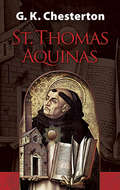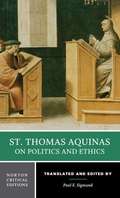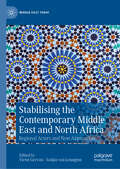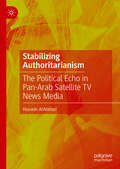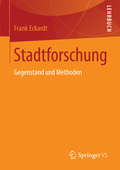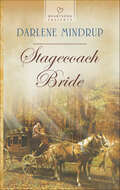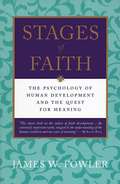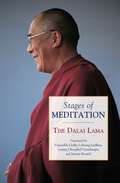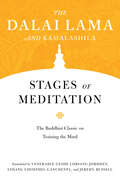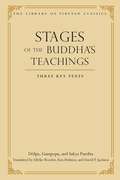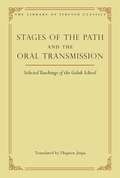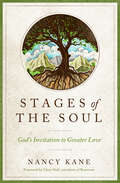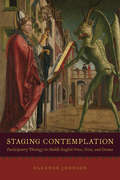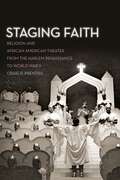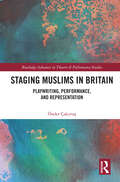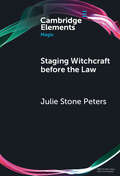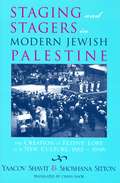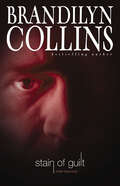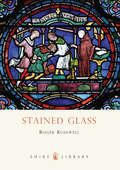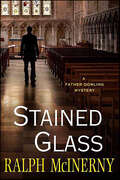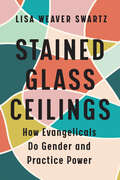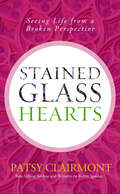- Table View
- List View
St. Thomas Aquinas
by G. K. ChestertonAcclaimed as the best book ever written on St. Thomas, this outstanding profile introduces one of Christianity's most important and influential thinkers. G. K. Chesterton chronicles the saint's life, focusing on the man and the events that shaped him, rather than on theology. In a concise, witty, and eminently readable narrative, he illustrates the relevance of St. Thomas' achievements to modern readers. Born into an aristocratic family, Thomas rejected a life of privilege to join a new order of preaching and teaching monks, the Dominicans. Chesterton compares Thomas' views to those of another famous thirteenth-century figure, St. Francis of Assisi. He also explores the influence of Aristotelian philosophy on Thomas' character, along with the effects of Parisian culture, society, and politics. The final chapter examines the impact of Thomas' work on later religious thinkers, including Martin Luther. This brief but vivid profile provides fascinating glimpses into the medieval scholastic movement, and it presents an excellent beginning to further explorations of St. Thomas Aquinas' works.
St. Thomas Aquinas On Politics And Ethics (Norton Critical Editions)
by Thomas Aquinas Paul E. SigmundThe selections not only include St. Thomas Aquinas's views ongovernment, law, war, property, and sexual ethics, but also provide thetheological, epistemological, and psychological background for hispolitical and ethical thought, including the Five Proofs on theexistence of God and Aquinas's theories of knowledge, the soul, thepurpose of man, and the order of the universe. Throughout the book,footnotes explain technical terms and historical, biblical, andclassical references. "Backgrounds and Sources" follows the text, with selections from thewritings of Aristotle, St. Augustine, and Dionysius the Areopagite. "Interpretations" traces Aquinas's influence on medieval thought, onRoman Catholicism during the Renaissance, on early modern politicalthought (Richard Hooker and Francisco Suarez), on nineteenth-andtwentieth-century papal social thought, and on contemporary ChristianDemocratic political parties in Europe and Latin America. The volume concludes with "Contemporary Problems in Thomistic Ethics",which contains eight analyses of the influence of Aquinas's thought onmodern debates on war, contraception, and abortion. A Selected Bibliography is included.
Stabilising the Contemporary Middle East and North Africa: Regional Actors and New Approaches (Middle East Today)
by Saskia Van Genugten Victor GervaisThis book examines the changing dynamics of stabilisation efforts in the Middle East and North Africa. Written by recognised scholars and practitioners in the field, this volume provides a rich overview of the broader spectrum of stabilisation. The topics range from a comprehensive set of lessons learned in Afghanistan and Iraq to transitional justice and reconciliation efforts in Tunisia and international attempts to protect the region’s cultural heritage. Ultimately, this edited collection presents a comprehensive look at the attempts to increase stability in the MENA region.
Stabilizing Authoritarianism: The Political Echo in Pan-Arab Satellite TV News Media
by Hussein AlAhmadThe book explores the close relationship between media institutions and power elites in Arab societies. This relationship exists within an unprecedented state of competition among global powers for influence and control over necessary resources and consumer markets in the Middle East. These conflicts still ravage these societies, including Palestinian society, designated as a region characterized by "organized chaos," dominated by multiple forms of increasing political instability and complex sources of internal turmoil. Taking the specificity of the Palestinian internal conflict as a case study, the book explores the interrelationships between power elites at the three levels of international, regional, and domestic politics, via the news message of satellite TV news media outlets. This book will interest scholars of the Middle East, of media and authoritarianism, and of the sociology of the Arab world.
Stable that Bob Built / VeggieTales (Big Idea Books / VeggieTales)
by Cindy KenneyIn this silly story about a very Veggie Christmas Pageant, the beloved VeggieTales characters recreate the story of Jesus’ birth—complete with a mooing cow at the stable and pie-eating shepherds and their lambs.
Stadtforschung: Gegenstand und Methoden
by Frank EckardtDas Lehrbuch wendet sich an Studierende der Architektur, Stadtplanung, Urbanistik, Kunst und Kulturwissenschaften. Es soll den Studierenden ermöglichen, für ihr Studium und ihre Studienprojekte eine theoretische und methodische Grundlage zur Hand zu haben. Dabei soll einerseits ein Übersichtswissen vermittelt werden, in welcher Weise unterschiedliche Herangehensweisen aus den Sozialwissenschaften genutzt werden können, um konkrete Probleme in Städten in einer systematischen und realistischen Weise zu untersuchen. Andererseits wird das Buch zu grundlegenden Fragestellungen der Stadtforschung Positionen vermitteln, die zu einem besseren interdisziplinären Verständnis führen sollen.
Stagecoach Bride
by Darlene MindrupStagecoach Driver Adam Clark Is Used to Surprises But he never thought he'd find his childhood friend Amanda Ross applying for a dangerous driver's job. Now Adam's "little bundle of dynamite" is all grown up...and sparking feelings that are anything but brotherly. If he can't talk her out of her crazy scheme to assert her independence, he'll just have to protect her. Amanda's fiery personality dwarfs her small stature, but their journey westward tests even her indomitable spirit. And she learns she can trust Adam to keep her safe in the swirl of danger that surrounds them. Can these two old friends survive a treacherous trip...and open their hearts to one another before it's too late?
Stages of Faith: The Psychology of Human Development and the Quest For Meaning
by James W. FowlerFaith, as approached here, is not necessarily religious, nor is it to be equated with belief. Rather, faith is a person's way of leaning into and making sense of life. More verb that noun, faith is the dynamic system of images, values, and commitments that guide one's life. It is thus universal: everyone who chooses to go on living operated by some basic faith. Building on the contributions of such key thinkers as Piaget, Erikson, and Kohlberg, Fowler draws on a wide range of scholarship, literature, and firsthand research to present expertly and engagingly the six stages that emerge in working out the meaning of our lives--from the intuitive, imitative faith of childhood through conventional and then more independent faith to the universalizing, self-transcending faith of full maturity. Stages of Faith helps us to understand our own pilgrimage of faith, the passages of our own quest for meaning and value.
Stages of Meditation
by Kamalashila Dalai LamaA translation of the ancient classic Stages of Meditation, by Kamalashila, with commentary from everyone's favorite Buddhist teacher, the Dalai Lama.The Dalai Lama explains the principles of meditation in a practice-oriented format especially suited to Westerners. Based upon the middle section of the Bhavanakrama by Kamalashila--a translation of which is included--this is the most extensive commentary given by the Dalai Lama on this concise but important meditation handbook. It is a favorite text of the Dalai Lama, and he often takes the opportunity to give teachings on it to audiences throughout the world. In his words, "This text can be like a key that opens the door to all other major Buddhist scriptures." Topics include the nature of mind, how to develop compassion and loving-kindness, calm abiding wisdom, and how to establish a union of calm abiding and special insight.
Stages of Meditation: The Buddhist Classic on Training the Mind (Core Teachings of Dalai Lama #4)
by The Dalai Lama KamalashilaA translation of the ancient classic Stages of Meditation, by Kamalashila, with commentary from everyone's favorite Buddhist teacher, the Dalai Lama.The Dalai Lama explains the principles of meditation in a practice-oriented format especially suited to Westerners. Based upon the middle section of the Bhavanakrama by Kamalashila--a translation of which is included--this is the most extensive commentary given by the Dalai Lama on this concise but important meditation handbook. It is a favorite text of the Dalai Lama, and he often takes the opportunity to give teachings on it to audiences throughout the world. In his words, "This text can be like a key that opens the door to all other major Buddhist scriptures." Topics include the nature of mind, how to develop compassion and loving-kindness, calm abiding wisdom, and how to establish a union of calm abiding and special insight.
Stages of the Buddha's Teachings: Three Key Texts
by Dolpa Sakya Pandita Gampopa Ken Holmes David P. Jackson Ulrike RoeslerStages of the Buddha's Teachings is an extraordinary and systematized representation of the complete path to enlightenment. From the acclaimed Library of Tibetan Classics.The “stages of the teachings” or tenrim genre of Tibetan spiritual writing expounds the Mahayana teachings as a graded series of topics, from the practices required at the start of the bodhisattva’s career to the final perfect awakening of buddhahood. The three texts in the present volume all exerted seminal influence in the Tibetan Buddhist tradition. The first text, The Blue Compendium, presents the instructions of the Kadam teacher Potowa (1031–1106) as recorded by his student Dölpa (1059–1131). This text is followed by Gampopa’s (1079–1153) revered Ornament of Precious Liberation, which remains the most authoritative text on the path to enlightenment within the Kagyü school. The final text is Clarifying the Sage’s Intent, a masterwork by the preeiment sage of the Sakya tradition, Sakya Pandita (1182–1251).
Stages of the Path and the Oral Transmission: Selected Teachings of the Geluk School (Library of Tibetan Classics #6)
by Thupten JinpaA major contribution to the literature on Buddhist practice according to the Geluk school of Tibetan Buddhism from its foremost interpreter.Although it was the last major school to emerge in the Tibetan Buddhist tradition, the Geluk school has left an indelible mark on Buddhist thought and practice. The intellectual and spiritual brilliance of its founder, the great Tsongkhapa (1357–1419), has inspired generations of scholars and tantric yogis to place him at the heart of their daily meditative practice. The Geluk tradition&’s close ties to the Dalai Lamas have also afforded it an outsized influence in all aspects of Tibetan life for centuries. At its peak its combined monasteries boasted a population in the tens of thousands, and its sway encompassed the religious landscape of Mongolia and much of Central Asia. This widespread religious activity fostered a rich literary tradition, and fifteen seminal works are featured here representing four genres of that tradition. They include works on the stages of the path, or lamrim, the genre for which the Geluk is most renowned; works on guru yoga, centered around the core Geluk ritual Offering to the Guru (Lama Chöpa); teachings from the unique oral transmission of Geluk mahamudra, meditation on the nature of mind; and instructions on the three essential points—what to practice in life, at death, and in the bardo. Your guide to these riches, Thupten Jinpa, maps out their historical context and spiritual significance in his extensive introduction.
Stages of the Soul: God's Invitation to Greater Love
by Nancy KaneHow can you tell if you&’re actually growing?Sure, when you&’re working on getting rid of a huge character flaw you can see progress, but do you ever wish you had a roadmap for the spiritual journey for the rest of the time? Do you ever feel spiritually dry—or like something&’s just not working anymore in your spiritual life? If you find yourself longing for more satisfaction, joy, and intimacy with Christ, this book is for you. Stages of the Soul is about making tangible spiritual progress. It&’s about truly understanding—understanding like you&’ve never understood before—that you are deeply loved. Nancy Kane walks you through five stages of the soul&’s journey toward embracing God&’s love. As you learn about each stage you&’ll be able to:identify where you are in the process of spiritual growth understand the role of pain and suffering in your lifeexperience God&’s love in the radically deep way you were designed to experience it. Imagine loving God in a way that fills you up from the moment you wake up to the moment you go to bed. Imagine having Christ&’s love for the world flow out of your heart without insecurity, anxiety, or selfishness getting in the way. That what this bookis all about: radically deeper love. This book will help you see more clearly how the Lord tenderly guides us to greater wholeness, holiness, and love. But Stages of the Soul is not just another book, it will become both your companion and guide as you walk day by day in greater intimacy with ChristThere is nothing more valuable than help in your journey toward spiritual wholeness. Receive that gift today.
Stages of the Soul: God's Invitation to Greater Love
by Nancy KaneHow can you tell if you&’re actually growing?Sure, when you&’re working on getting rid of a huge character flaw you can see progress, but do you ever wish you had a roadmap for the spiritual journey for the rest of the time? Do you ever feel spiritually dry—or like something&’s just not working anymore in your spiritual life? If you find yourself longing for more satisfaction, joy, and intimacy with Christ, this book is for you. Stages of the Soul is about making tangible spiritual progress. It&’s about truly understanding—understanding like you&’ve never understood before—that you are deeply loved. Nancy Kane walks you through five stages of the soul&’s journey toward embracing God&’s love. As you learn about each stage you&’ll be able to:identify where you are in the process of spiritual growth understand the role of pain and suffering in your lifeexperience God&’s love in the radically deep way you were designed to experience it. Imagine loving God in a way that fills you up from the moment you wake up to the moment you go to bed. Imagine having Christ&’s love for the world flow out of your heart without insecurity, anxiety, or selfishness getting in the way. That what this bookis all about: radically deeper love. This book will help you see more clearly how the Lord tenderly guides us to greater wholeness, holiness, and love. But Stages of the Soul is not just another book, it will become both your companion and guide as you walk day by day in greater intimacy with ChristThere is nothing more valuable than help in your journey toward spiritual wholeness. Receive that gift today.
Staging Contemplation: Participatory Theology in Middle English Prose, Verse, and Drama
by Eleanor JohnsonWhat does it mean to contemplate? In the Middle Ages, more than merely thinking with intensity, it was a religious practice entailing utter receptiveness to the divine presence. Contemplation is widely considered by scholars today to have been the highest form of devotional prayer, a rarified means of experiencing God practiced only by the most devout of monks, nuns, and mystics. Yet, in this groundbreaking new book, Eleanor Johnson argues instead for the pervasiveness and accessibility of contemplative works to medieval audiences. By drawing together ostensibly diverse literary genres—devotional prose, allegorical poetry, cycle dramas, and morality plays—Staging Contemplation paints late Middle English contemplative writing as a broad genre that operated collectively and experientially as much as through radical individual disengagement from the world. Johnson further argues that the contemplative genre played a crucial role in the exploration of the English vernacular as a literary and theological language in the fifteenth century, tracing how these works engaged modes of disfluency—from strained syntax and aberrant grammar, to puns, slang, code-switching, and laughter—to explore the limits, norms, and potential of English as a devotional language. Full of virtuoso close readings, this book demonstrates a sustained interest in how poetic language can foster a participatory experience of likeness to God among lay and devotional audiences alike.
Staging Faith: Religion and African American Theater from the Harlem Renaissance to World War II
by Craig R. PrentissIn the years between the Harlem Renaissance and World War II, African American playwrights gave birth to a vital black theater movement in the U.S. It was a movement overwhelmingly concerned with the role of religion in black identity. In a time of profound social transformation fueled by a massive migration from the rural south to the urban‑industrial centers of the north, scripts penned by dozens of black playwrights reflected cultural tensions, often rooted in class, that revealed competing conceptions of religion's role in the formation of racial identity.Black playwrights pointed in quite different ways toward approaches to church, scripture, belief, and ritual that they deemed beneficial to the advancement of the race. Their plays were important not only in mirroring theological reflection of the time, but in helping to shape African American thought about religion in black communities. The religious themes of these plays were in effect arguments about the place of religion in African American lives.In Staging Faith, Craig R. Prentiss illuminates the creative strategies playwrights used to grapple with religion. With a lively and engaging style, the volume brings long forgotten plays to life as it chronicles the cultural and religious fissures that marked early twentieth century African American society.Craig R. Prentiss is Professor of Religious Studies at Rockhurst University in Kansas City, Missouri. He is the editor of Religion and the Creation of Race and Ethnicity: An Introduction (New York University Press, 2003).
Staging Muslims in Britain: Playwriting, Performance, and Representation (Routledge Advances in Theatre & Performance Studies)
by Önder ÇakırtaşThis scholarly volume delves into the manner in which British Muslims articulate their cultural, social and religious identities through theatrical productions in 21st-century Britain and examines their portrayal within these performances.The study investigates the factors influencing the emergence and evolution of Islamic theatre in Britain, providing an in-depth analysis of plays by British playwrights of both Muslim and non-Muslim origins that have shaped the trajectory of British Islamic theatre from the late 20th century to the present. Önder Çakırtaş critically examines how British playwrights, predominantly of Muslim origin but also including some of non-Muslim origin, depict Muslim identity and culture from their unique perspectives, particularly in the context of post-9/11 society. Adopting a comprehensive approach to Islamic playwriting and performance, this book highlights the accomplishments and contributions of contemporary British playwrights, primarily from Muslim backgrounds.This study will be of significant interest to scholars and students in theatre studies, as well as related disciplines such as Islamic studies, sociology and political science.
Staging Witchcraft Before the Law: Scepticism, Performance as Proof, and Law as Magic in Early Modern Witch Trials (Elements in Magic)
by Julie Stone PetersWhile the judicial machinery of early modern witch-hunting could work with terrifying swiftness, skepticism and evidentiary barriers often made conviction difficult. Seeking proof strong enough to overcome skepticism, judges and accusers turned to performance, staging 'acts of Sorcery and Witch-craft manifest to sense.' Looking at an array of demonological treatises, pamphlets, documents, and images, this Element shows that such staging answered to specific doctrines of proof: catching the criminal 'in the acte'; establishing 'notoriety of the fact'; producing 'violent presumptions' of guilt. But performance sometimes overflowed the demands of doctrine, behaving in unpredictable ways. A detailed examination of two cases – the 1591 case of the French witch-demoniac Françoise Fontaine and the 1593 case of John Samuel of Warboys –suggests the manifold, multilayered ways that evidentiary staging could signify – as it can still in that conjuring practice we call law. This title is also available as Open Access on Cambridge Core.
Staging and Stagers in Modern Jewish Palestine: The Creation of Festive Lore in a New Culture, 1882-1948 (Raphael Patai Series in Jewish Folklore and Anthropology)
by Chaya Naor Yaacov Shavit Shoshana SittonThis fascinating case study describes the work of the people responsible for creating festive lore and its system of ceremonies and festivities--an inseparable part of every culture. In the case of the new modern Hebrew culture of Eretz Israel (modern Jewish Palestine)--a society of immigrants that left behind most of their traditional folkways--the creation of festival lore was a conscious and organized process guided by a national ideology and aesthetic values. This creative effort in a secular national society served as an alternative to the traditional religious system, adapted the ceremonies and festivals to a new historical reality, and created a new festival cycle that would give expression and joy to the values and symbols of the new Jewish society.Staging and Stagers in Modern Jewish Palestine claims that the system of ceremonies and festivals, in general, and each separate ceremony and festival were staged according to the staging instructions written by a defined group of cultural activists. The book examines three main stages--the educational network, rural society (particularly the cooperative sector), and urban society (most notably Tel Aviv)--and looks at the stagers themselves, who were schoolteachers, writers, artists, and cultural activists. Though cultural systems of festivals and ceremonies are often researched and described, scholarly literature rarely identifies their creators or studies in detail the manner in which these systems are created. Staging and Stagers in Modern Jewish Palestine sheds important light on the stagers of modern Jewish Palestine and also on the processes and mechanisms that created the performative lore in other cultures, in ancient as well as modern times.
Stain of Guilt (Hidden Faces Series #2)
by Brandilyn CollinsAs I drew, the house felt eerie in its silence. . . . A strange sense stole over me, as though Bland and I were two actors on stage, our movements spotlighted, black emptiness between us. But that darkness grew smaller as the space between us shrank. I did not know if this sense was due to my immersion in Bland&’s face and mind and world, or to my fear of his threatening presence. Or both . . . The nerves between my shoulder blades began to tingle. Help me, God. Please. For twenty years, a killer has eluded capture for a brutal double murder. Now, forensic artist Annie Kingston has agreed to draw the updated face of Bill Bland for the popular television show American Fugitive. To do so, Annie must immerse herself in Bland&’s traits and personality. A single habitual expression could alter the way his face has aged. But as she descends into his criminal mind and world, someone is determined to stop her. At any cost. Annie&’s one hope is to complete the drawing and pray it leads authorities to Bland—before Bland can get to her. Brandilyn Collins is the bestselling author of Brink of Death, Eyes of Elisha, and other novels. She and her family divide their time between the California Bay Area and Coeur d&’Alene, Idaho. Visit her website at www.brandilyncollins.com.
Stained Glass
by Roger RosewellFor over a thousand years stories of Christian belief and great moments in British history have filled the windows of our cathedrals and parish churches. The glow of painted and stained glass, its radiant colours and vivid pictures, has inspired generations of audiences and artists. This beautifully illustrated book traces the development of a unique art from its earliest beginnings in Anglo-Saxon England to the present day. It includes fascinating descriptions of medieval and renaissance glass, the religious upheavals of the sixteenth and seventeenth centuries which saw thousands of windows destroyed, the rebirth of the craft in Georgian and Victorian Britain, and the pioneering of exciting new styles and techniques by modern artists.Explanations of how stained glass windows are made, the secrets of medieval glaziers, the subjects that can be seen and where the best examples from the seventh to twenty-first centuries can be found add to its pleasures.
Stained Glass (Father Dowling Mysteries)
by Ralph McInernyTough times and the unsolved murders of anyone with ties to the Deveres---a family of wealthy parish patrons---back Father Dowling up against a wall in his struggle to save his church from the chopping block.With too many churches and not enough people to fill them, the Archdiocese has to make some cuts, and many of them, including the proposed closing of St. Hilary's, are dangerously close to the bone. Father Dowling rushes to drum up support from church officials and parishioners, including the Deveres, who don't want to see the stained glass windows they donated go anywhere other than the church they were meant for, but they can hardly be of help when those closest to them start turning up dead.Church politics, long-kept family secrets, and a determined killer come together to put St. Hilary's---a church that countless characters and devoted readers have come to love---and its parishioners in peril in Stained Glass, the latest in Ralph McInerny's treasured mystery series.
Stained Glass Ceilings: How Evangelicals Do Gender and Practice Power
by Lisa Weaver SwartzStained Glass Ceilings speaks to the intersection of gender and power within American evangelicalism by examining the formation of evangelical leaders in two seminary communities.Southern Baptist Theological Seminary inspires a vision of human flourishing through gender differentiation and male headship. Men practice “Godly Manhood," and are taught to act as the "head" of a family, while their wives are socialized into codes of “Godly Womanhood" that prioritize prescribed gender roles. This power structure privileges men yet offers agency to their wives in women-centered spaces and through marital relationships. Meanwhile, Asbury Theological Seminary promises freedom from gendered hierarchies. Appealing to a story of gender-blind equality, Asbury welcomes women into classrooms, administrative offices, and pulpits. But the institution’s construction of egalitarianism obscures the fact that women are rewarded for adapting to an existing male-centered status quo rather than for developing their own voices as women. Featuring high-profile evangelicals such as Al Mohler and Owen Strachan, along with young seminarians poised to lead the movement in the coming decades, Stained Glass Ceilings illustrates the liabilities of white evangelical toolkits and argues that evangelical culture upholds male-centered structures of power even as it facilitates meaning and identity.
Stained Glass Hearts: Seeing Life from a Broken Perspective
by Patsy ClairmontStained Glass Heartsreminds us just how brightly the light of God can shine even amidst our darkest moments, uncovering the promise and possibility of redemption and transformation.Comparing people to stained glass windows, Patsy Clairmont explains the power of God to restore and redeem that which seems devastated beyond repair, and she does so with the quick wit and deep insight of someone who has been there. And back. Themes of art and creativity are woven together with stories from Patsy’s own life. And special features include quotes, suggested scripture readings, sample prayers, and recommended music.With candor tempered by wind-whipped wisdom, Patsy provides a new lens through which to view our lives. Stained Glass Hearts is a perspective that gives us the chance to see our potential for color, sparkle, and great purpose through the grace of God.
Stainless Steal Hearts
by Harry Lee Kraus Jr.Promising surgical resident, Matt Stone, uncovers a secret so big it could ruin his medical career forever! When he finds out that chief surgeon Dr. Michael Simons and local abortionist are 'stealing' the hearts of aborted fetuses and giving them to infants with congenital heart problems, he has to make the most difficult decision of his life...
